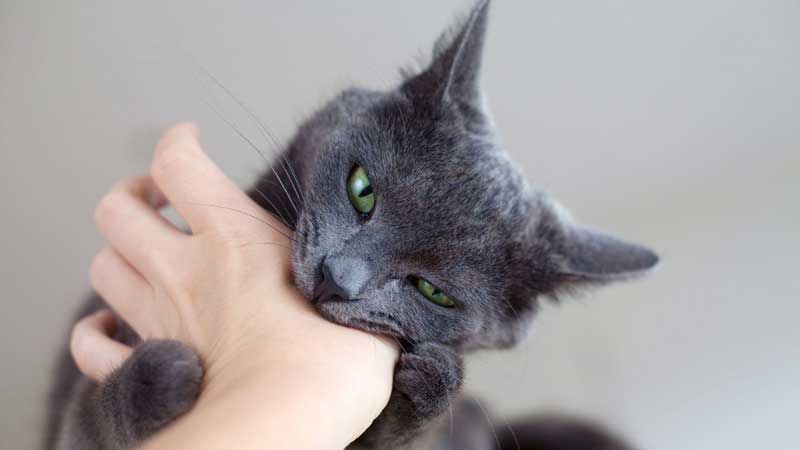The 7 Reasons Cats Bite, and How to Stop The Behavior

It's a fact of life: cats bite a lot. And when they do, it can be painful and even dangerous. The good news is that you can do things to help stop your cat from biting. This post will help provide tips on preventing your cat from biting. That will help you keep your cat healthy and avoid any potential health risks posed by bites. You will also find out why your cat bites in the first place.
Below is a comprehensive guideline to help you figure out how to stop your cat's biting habits. The following are seven reasons cats bite and how to stop it.
1. Your Cat May Be Stressed
Many things can cause stress in cats, including changes in their environment, such as a move to a new home. Other potential stressors include the addition of a new pet or baby to the family or even something as simple as a change in the routine. When stressed, cats may express this through aggression, including biting.
If you think your cat may be stressed, you can do a few things to help. First, try to identify the source of the stress and remove it if possible. If that's not possible, or if your cat is still showing signs of stress, there are products available that can help, such as pheromone diffusers. You can also talk to your veterinarian about medications that may help your cat relax.
2. Your Cat May Be in Pain
Cats are very good at hiding pain, but that doesn't mean they're not in pain. If your cat is biting, it may be because they're in pain and are trying to tell you. If you think your cat may be in pain, the best thing to do is to take them to the vet. They can determine if there is a problem and provide treatment if necessary.
3. Your Cat May Be Hungry or Thirsty
Cats can become aggressive when hungry or thirsty, so ensure your cat always has access to it. If you're going to be away from home for more than a few hours, leave out enough food and water for your cat to last until you return.
4. Over-stimulation
Cats can become over-stimulated when they are played with too roughly. That can often happen when children play with them without understanding how to interact with a cat appropriately. A cat biting more than usual may be a sign that they are feeling over-stimulated and need to take a break. If you think your cat may be biting out of over-stimulation, try providing them with other stimulation forms, such as toys or puzzle feeders.
5. Fear or anxiety
Cats may also bite out of fear or anxiety. If your cat feels threatened, it may lash out to protect itself. Signs that your cat is feeling fear or anxiety include:
• Hiding
• Cowering
• Flattened ears
• Rapid breathing
• Dilated pupils
• Tail tucked between the legs
You can help your cat feel more secure by providing a safe hiding place, such as a cat carrier or hiding place in your home. It would help if you also avoided anything that may startle your cat or make it feel scared, such as loud noises or sudden movements. If your cat still feels fear or anxiety despite your efforts to help it feel more secure, you may need to consult a veterinarian or animal behaviorist to find other ways to help it feel calm and safe.
6. Boredom or Lack of Stimulation
Cats may also bite out of boredom or lack of stimulation. If your cat does not have enough to do, it may become restless and start biting. To help prevent your cat from becoming bored, make sure it has plenty of toys to play with and opportunities to run and exercise. You might also want to consider getting a second cat so your feline friend has someone to play with.
7. Teething
Kittens may bite more than usual when they are teething. That is because their gums are sore and trying to relieve the discomfort. You can help soothe your kitten's gums by giving it a wet washcloth or a special teething toy to chew.
How to stop a cat from biting
You can stop your cat from biting you by doing the following:
Establish trust and respect
The first step to stopping a cat from biting is establishing trust and respect between you and your feline friend. That means taking things slowly at first, letting your cat approach you on its terms, and offering it plenty of positive reinforcement in the form of treats, petting, and playtime.
Understand why cats bite
It's essential to understand that cats bite for various reasons, including fear, frustration, pain, and even love. By understanding why your cat is biting, you can take steps to address the underlying issue.
Provide adequate stimulation
Cats are natural hunters and need plenty of stimulation to stay happy and healthy. If your cat is bored, it may start biting you as a way to release its energy. Ensure you provide your cat with plenty of toys, climbing opportunities, and playtime.
Avoid rough play: Many people mistakenly believe that rough play is an excellent way to bond with their cats. However, this can lead to biting. Cats can become overstimulated during rough play and may lash out with their teeth as a way to defend themselves. Stick to gentle play instead.
Be consistent
It's essential to be persistent with your rules about biting. If you allow your cat to bite you sometimes, it will be more difficult to stop the behavior. Ensure everyone in your household is on the same page about biting and enforce the rules consistently.
Seek professional help
If you've tried all of the above and your cat is still biting, it's time to seek professional help. A behaviorist or veterinarian can help you identify the problem's root cause and devise a plan to stop the biting.
Be patient
Finally, patience is essential to stop your cat from biting. It will take time and patience to see results like all behavior changes. But if you're consistent with your efforts, you should eventually be able to stop the biting.
Conclusion
Cats bite for various reasons, including fear, frustration, pain, and even love. By understanding why your cat is biting, you can take steps to address the underlying issue and stop the biting behavior.
Remember to be patient and consistent with your efforts, and you should eventually be successful in controlling your cat from biting. If your cat is displaying any other troubling behaviors, such as aggression or urinating outside the litter box, it's essential to seek professional help.
You May Also Like
 Cat Behavior7 Signs Your Cat Is "Spoiled", Is Your Cat?
Cat Behavior7 Signs Your Cat Is "Spoiled", Is Your Cat? Breed ReviewsThe 8 Least Aggressive Cat Breeds (Gentle Cat Breeds)
Breed ReviewsThe 8 Least Aggressive Cat Breeds (Gentle Cat Breeds) Breed Reviews10 Best Cat Breeds for First-Time Owners
Breed Reviews10 Best Cat Breeds for First-Time Owners Breed ReviewsThe 10 Best Cat Breeds for Cuddling
Breed ReviewsThe 10 Best Cat Breeds for Cuddling Help & AdviceHow Do I Know if My Cat Needs to be Neutered?
Help & AdviceHow Do I Know if My Cat Needs to be Neutered? Cat Behavior & TrainingLoving Them Right: Let Cats Play!
Cat Behavior & TrainingLoving Them Right: Let Cats Play!